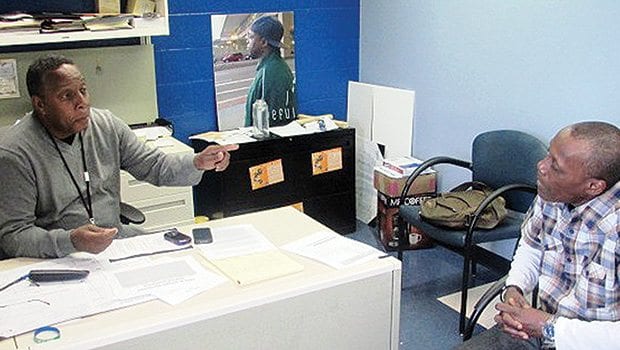Roxbury Presbyterian Church supports Strong Men’s Recovery Group
Special Advertorial Health Section - Weekly gathering tackles effects of stress, trauma

There usually are four or five of them sitting in a small circle in the Pastor’s Parlor at Roxbury Presbyterian Church. They speak quietly and if you weren’t paying close attention you might mistake them for a bible study group or a prayer meeting. But when you listen in, you hear words like “cravings,” “cold turkey,” “co-dependence,” the language of addiction and, according to Douglas Lomax, the language of trauma. Lomax is the leader of the “Strong Men’s Recovery Group” that meets weekly at RPC, one of a growing number of recovery groups making the connection between substance abuse and trauma.
According to Lomax, while we tend to think of trauma in terms of the September 11 terrorist attack or war, in fact it can be the result of far more common experiences that come from simply living in the city — experiences ranging from poverty to gun violence. “Urban living can be stressful living and stress is a contributing factor to substance abuse,” Lomax says. “Unfortunately, there are many people who try to treat stress by self medicating. Far too often, the result is addiction.”
Meeting each Thursday, the Strong Men’s Recovery Group invites participants to share their pain and struggles in a safe and supportive community. Some of the men are re-entering society from incarceration or addiction treatment; others may have fallen off the community radar altogether and need consistent support to help them back up.
Lomax, who comes from a judicial and corrections background, leads groups similar to “Strong Men” inside prison. He says he felt the need to walk with men in the community as they were “living through their trauma” as well. He chose Roxbury Presbyterian Church for the support group not only because of the church’s central location but also because of the church’s history in housing one of the first Alcoholics Anonymous sites in the community. “It just made sense to do it here” Lomax says. Though trauma and pain are the constant threads running through all of the men’s stories, Lomax says the group also is tackling other “men issues” like how to be good fathers, husbands and sons.
“We talk through our shame and fears and allow each other to share our pain.”
Lomax speaks passionately on the effects of trauma in the African American community. “The societal norm for men, particularly black men, is to be tough and brave with no signs of emotion or weakness. One thing you definitely do not do as a black man is cry.
“That is our dilemma,” Lomax recounts hearing from men who were sexually abused and had never spoken about it for 20 or 30 years. Unfortunately this is not uncommon. “Unvented pain leads to our trauma and when it continues to go untreated, it leads to addiction, anger and violence.” The Strong Men’s Recovery Group wants to reverse all of these trends. Lomax says “Since slavery, men of color have had to mask their emotions.
“They’d watch their wives taken and used by their masters and they had to stand there and pretend not to hurt, masking their feelings for survival. These masks still haunt men today. And though some would consider their masks survival mechanisms, in fact they create an experience of merely existing instead of living. Strong Men’s Recovery Group helps men to live again.”


![Banner [Virtual] Art Gallery](https://baystatebanner.com/wp-content/uploads/2024/04/Cagen-Luse_Men-at-store-e1713991226112-150x150.jpg)



